Karachi halwa recipe with step by step photos. Soft and melt in the mouth is karachi halwa which is also known as Bombay halwa. Karachi halwa is made with basically four ingredients – corn flour, ghee, water and sugar. Overall an easy sweet that you can prepare for a festive time.
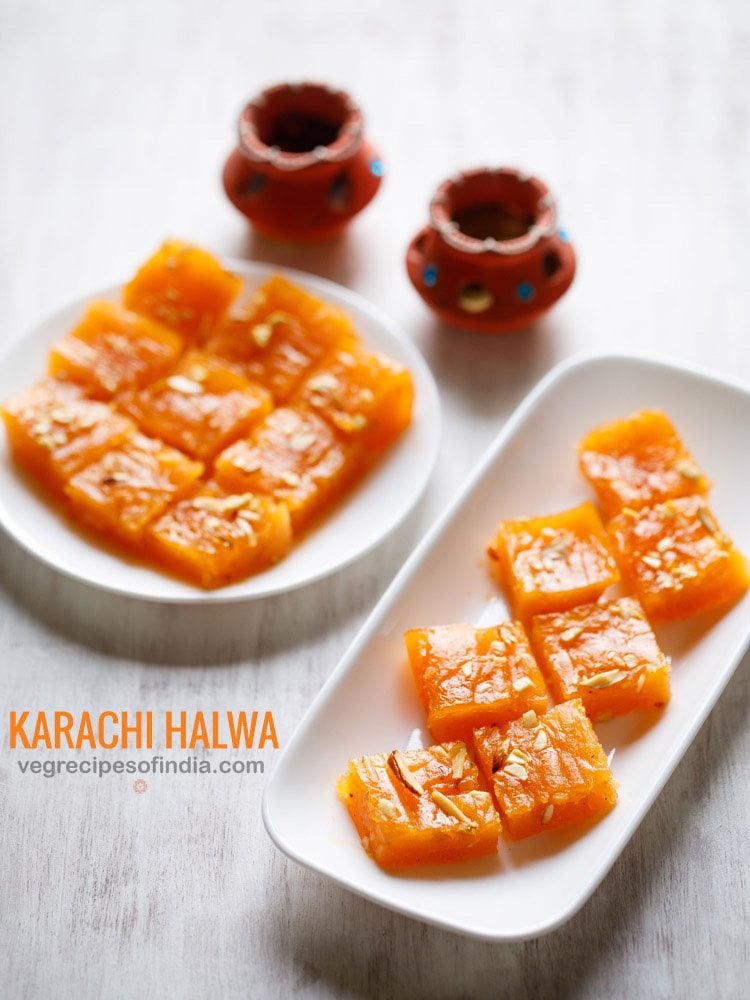
I had got some recipe requests to share karachi halwa, hence sharing the recipe. Making karachi halwa is easy and does not take much time also.
Karachi halwa is not your everyday sweet, so best to make during festive occasions or special occasions. The recipe shared here gives you a soft and super delicious halwa. It does not have a chewy texture.
The smooth, gelatinous texture of the Bombay Halwa is well balanced with the crunchiness from the dry fruits or nuts that are essentially used in it. Once the halwa is set, it is usually cut into pieces and sold as a mithai.
While making karachi halwa you can add
- Your choice of dry fruits in the halwa. I have added almonds and cashews.
- Instead of ghee you can use oil. But I would say that, use ghee as it imparts a really good taste and aroma.
- For the color, you can use orange, yellow, red, pink or green color. I have used natural orange color extract. Do avoid using artificial food colors. You can also use saffron strands for a yellow color.
The corn flour used in making karachi halwa is the white colored corn flour. This white colored corn flour is called as corn starch in western countries. In India we call it as corn flour. So if you live in Europe or America, use corn starch to make karachi halwa.
Karachi halwa can be served as a festive sweet or as a sweet after meals. Wishing all our readers and well wishers a happy and prosperous Diwali.
How to make Karachi Halwa
1. First take 1 cup of corn flour (100 grams) in a mixing bowl.
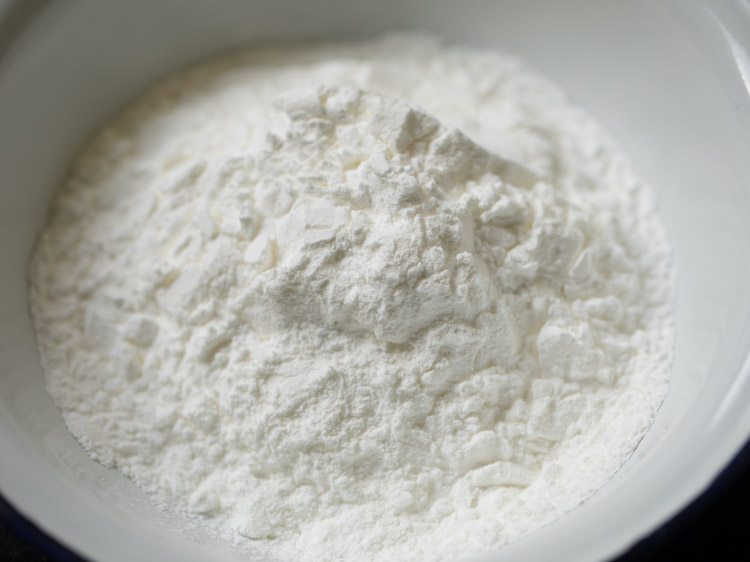
2. Add 1 cup water.
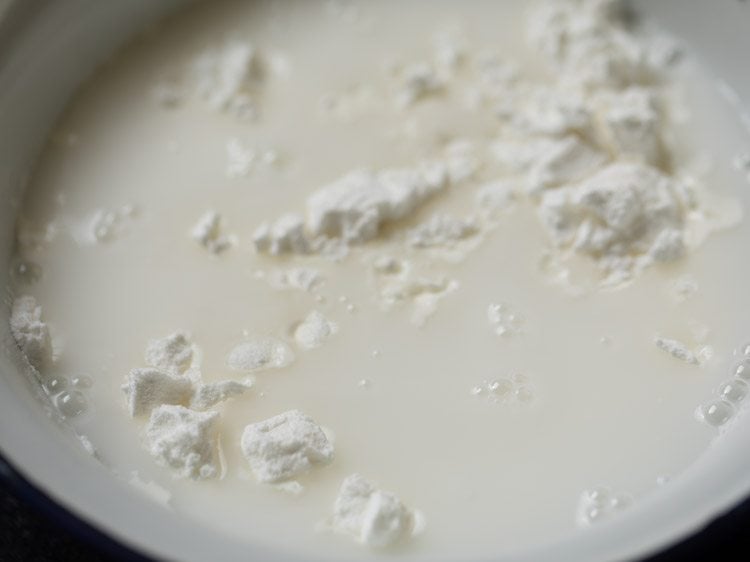
3. Mix very well with a wired whisk. There should be no lumps. Keep aside.
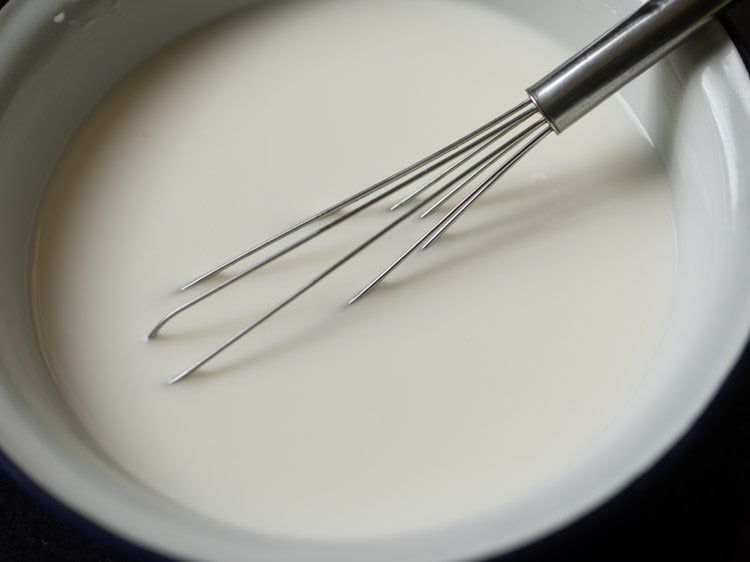
4. Line a tray or pan with butter paper or parchment paper. Alternatively you can grease the pan on the bottom and sides with some ghee. Keep aside.
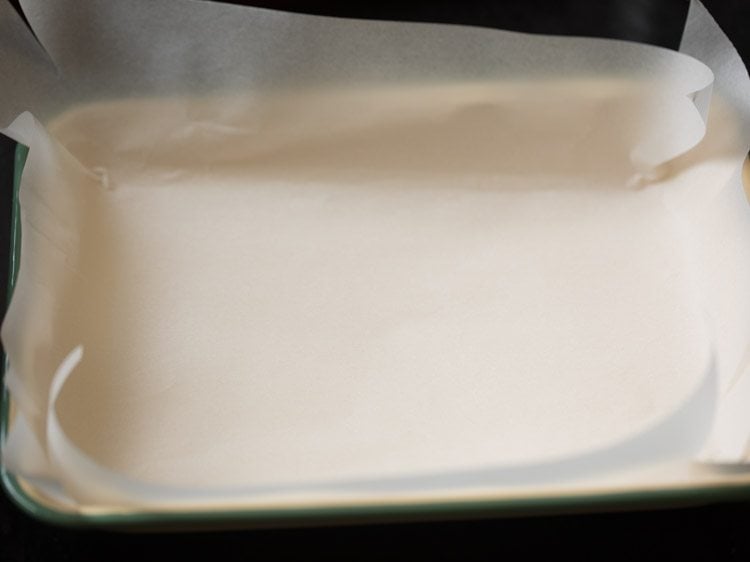
Preparing sugar solution
5. In a heavy kadai take 1 cup of sugar (200 grams).
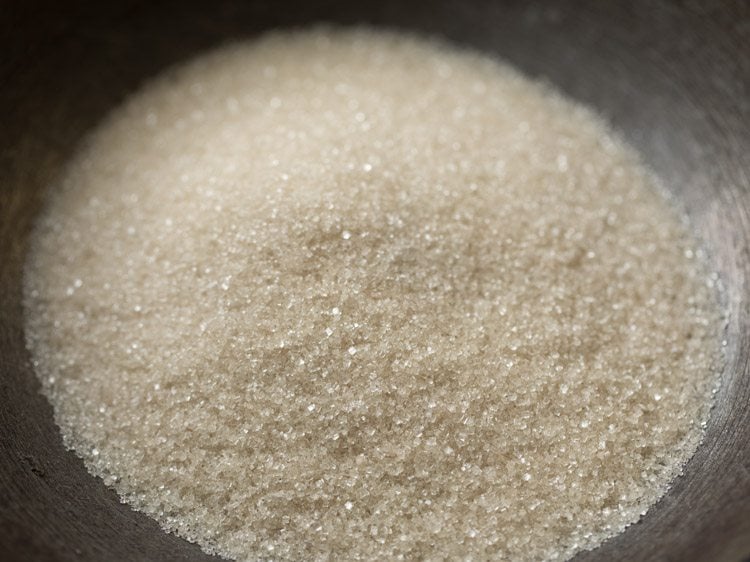
6. Add ½ cup water.
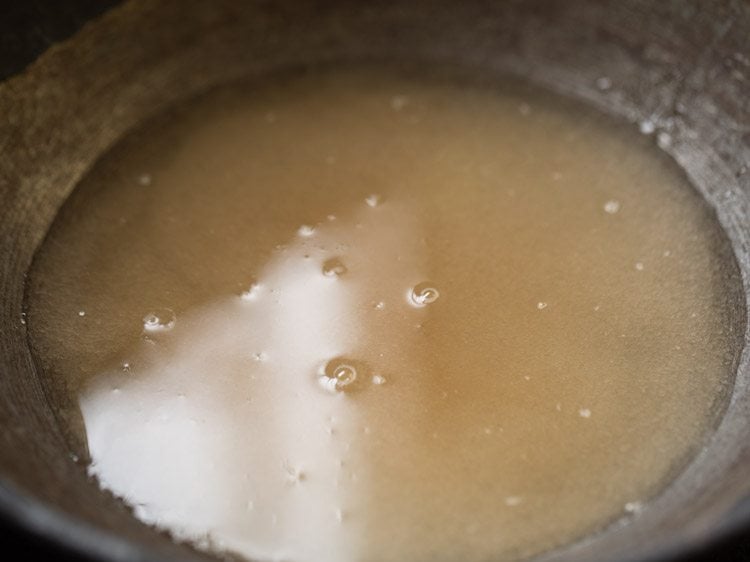
7. Add 5 to 6 drops of natural orange color extract. You can use any natural color extract like yellow, red, pink, green. you can also use about 1 pinch of saffron strands for a faint yellow color.
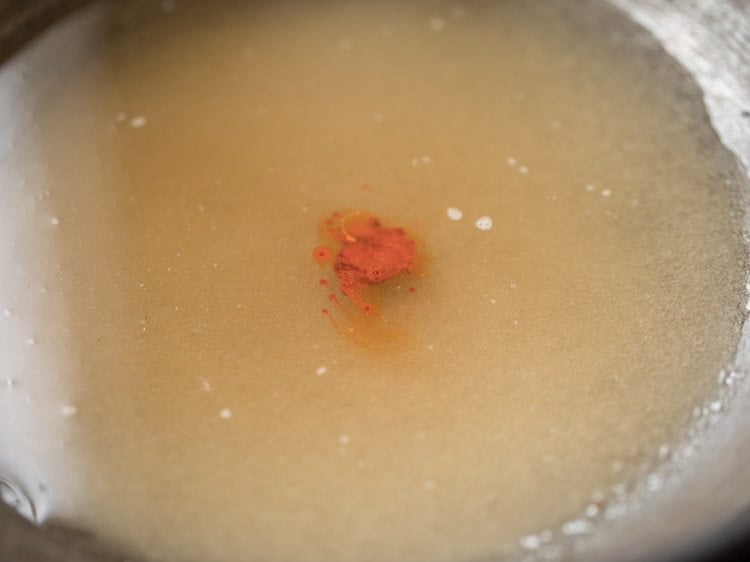
8. Add 1 teaspoon lemon juice.
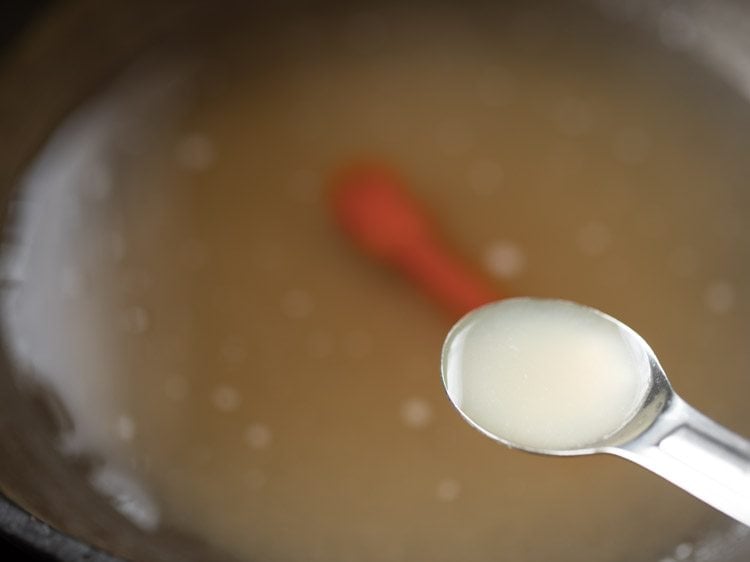
9. Mix well and keep the pan on a stove top.
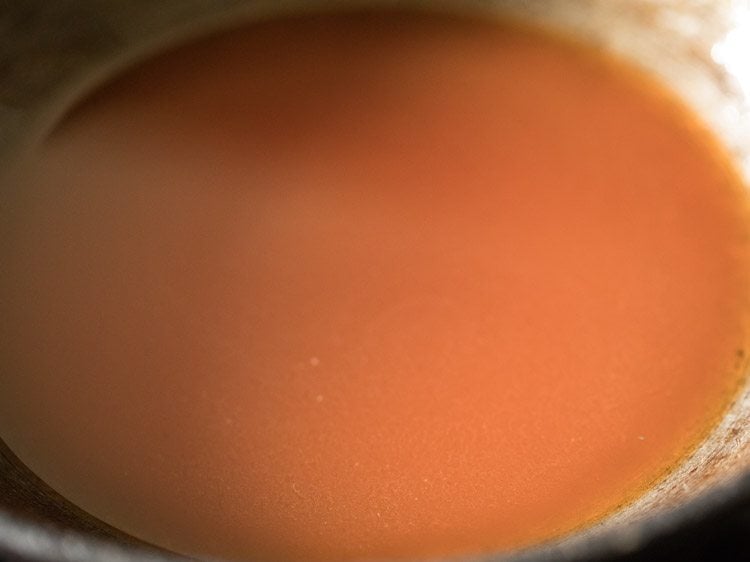
10. Keep the flame to medium-low and begin stirring the solution, so that the sugar solution dissolves. Then reduce the flame to a low or sim. Keep the flame to its lowest.
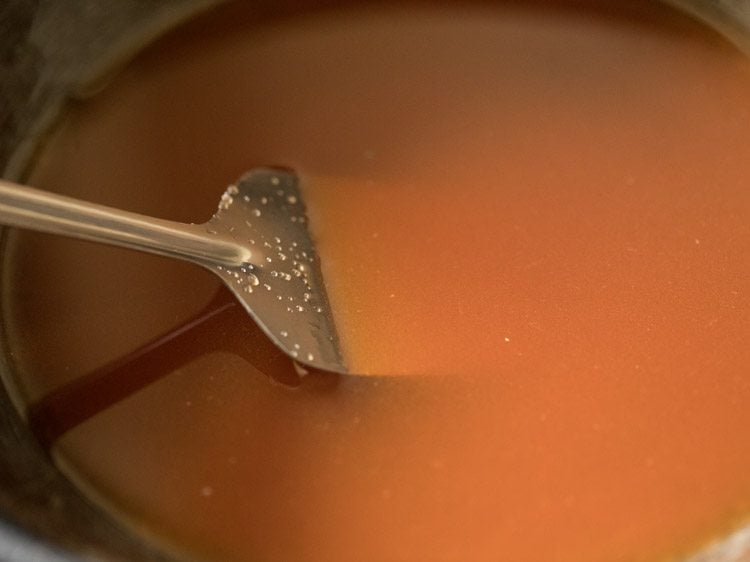
11. Let the sugar solution come to a boil.
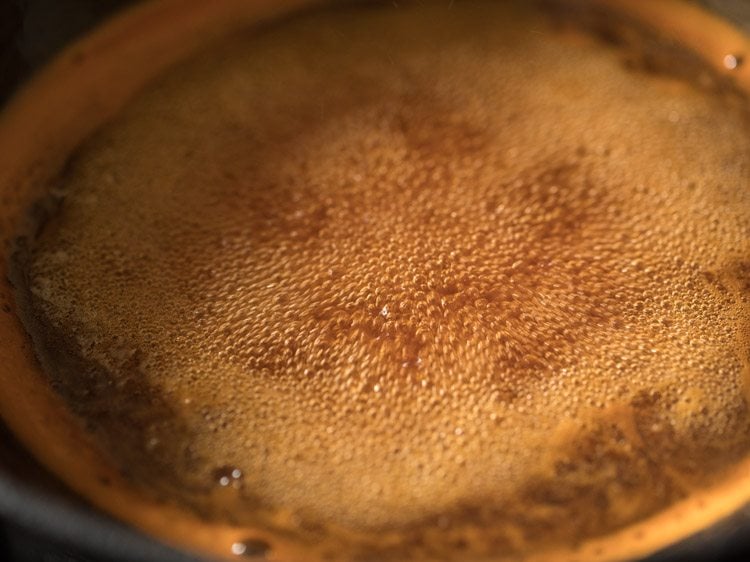
Making karachi halwa
12. Now take the corn starch solution and stir it again as the corn starch settles down at the bottom, so you have to mix everything again before you add in the sugar syrup.
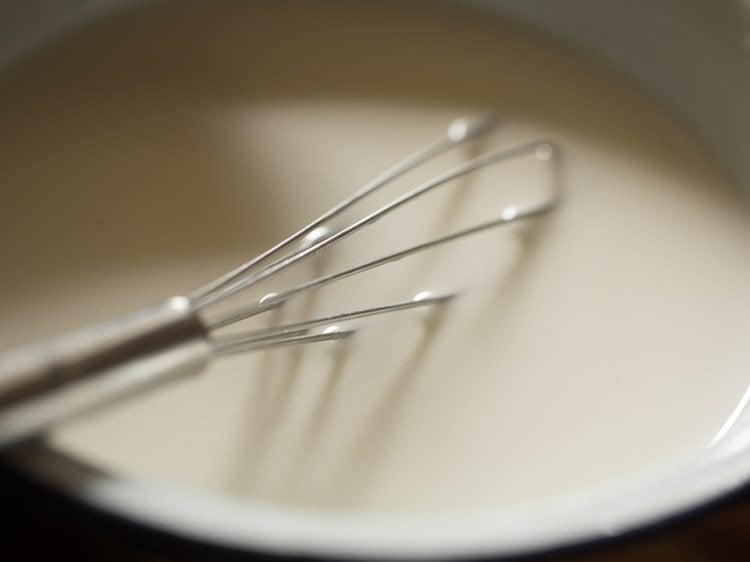
13. Add a part of the corn flour solution. Add corn flour solution in two to three parts.
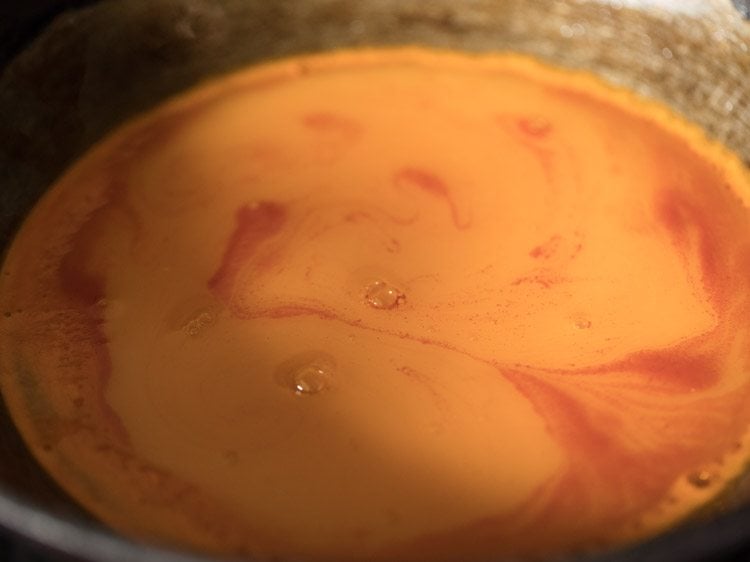
14. As soon as you add mix very well with a wired whisk.
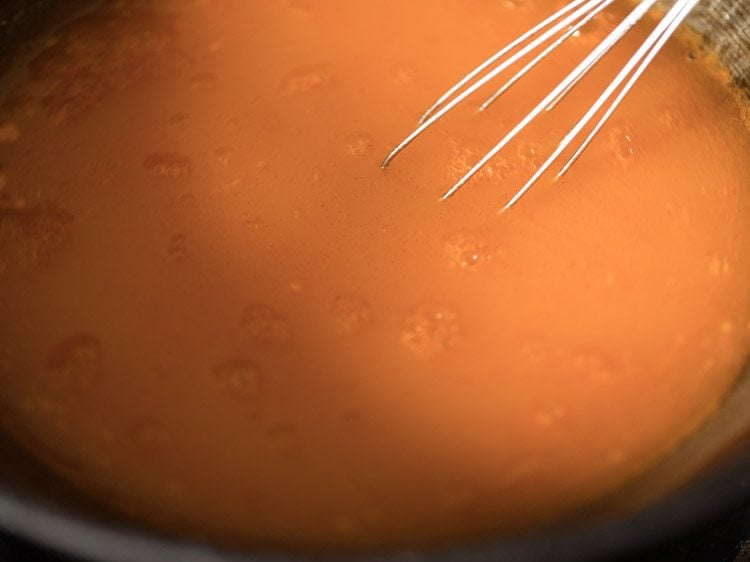
15. Then add the second part of the corn flour solution.
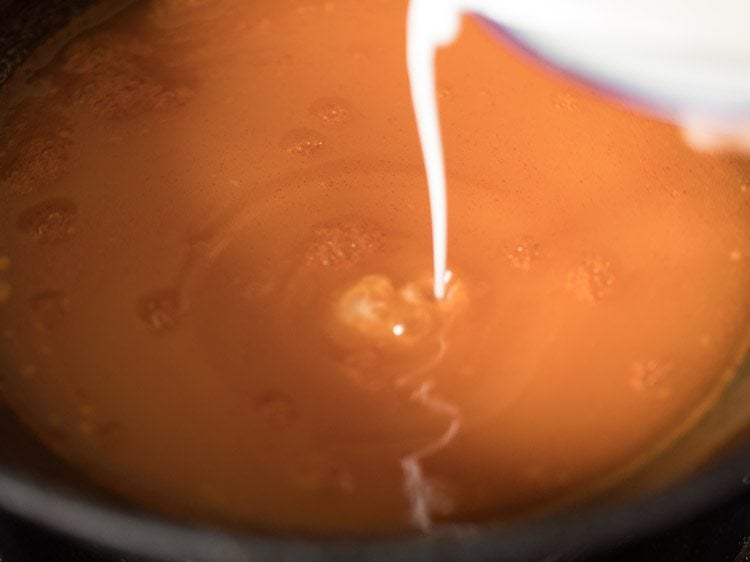
16. Mix and stir very well.
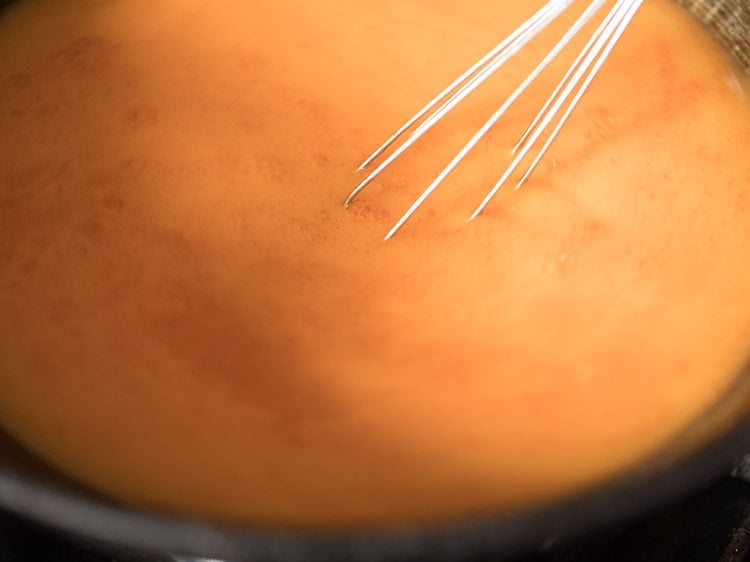
17. Continue to mix and stir at non stop on a low flame. Now use a spatula or a spoon for stirring instead of wired whisk.
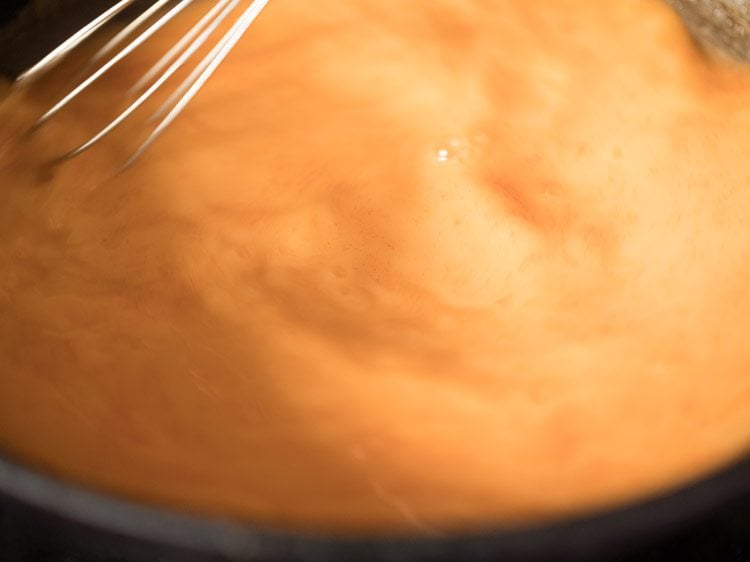
18. The corn flour will begin to become sticky and thicken. Keep on stirring.
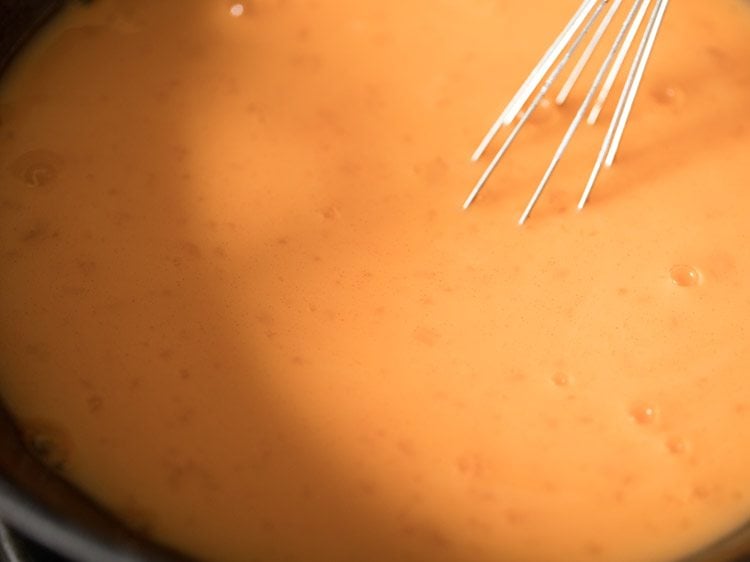
19. Stir and mix till the entire mixture thickens.
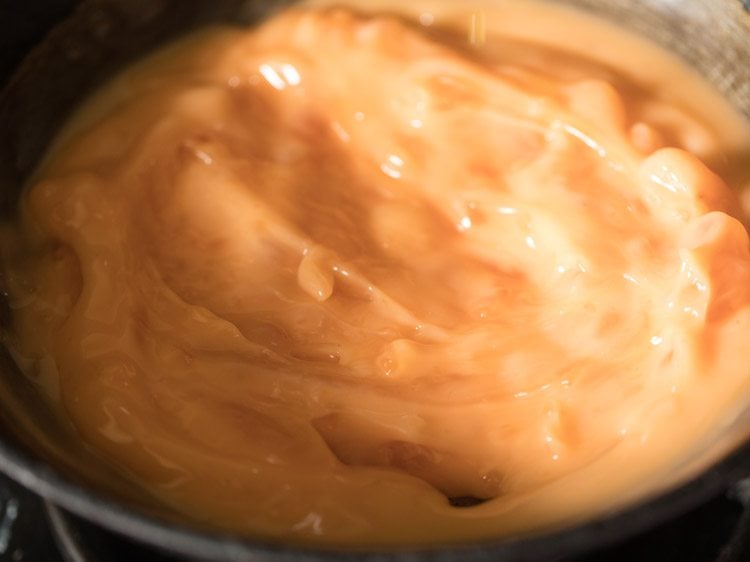
20. Once the entire mixture thickens, add ¼ cup ghee in two to three parts.
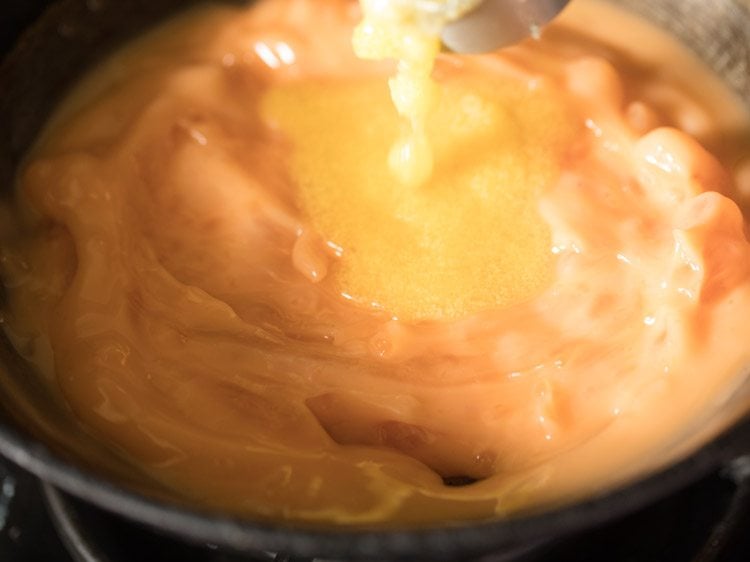
21. As soon as you add ghee, mix well so that all of the ghee is incorporated in the corn flour mixture.
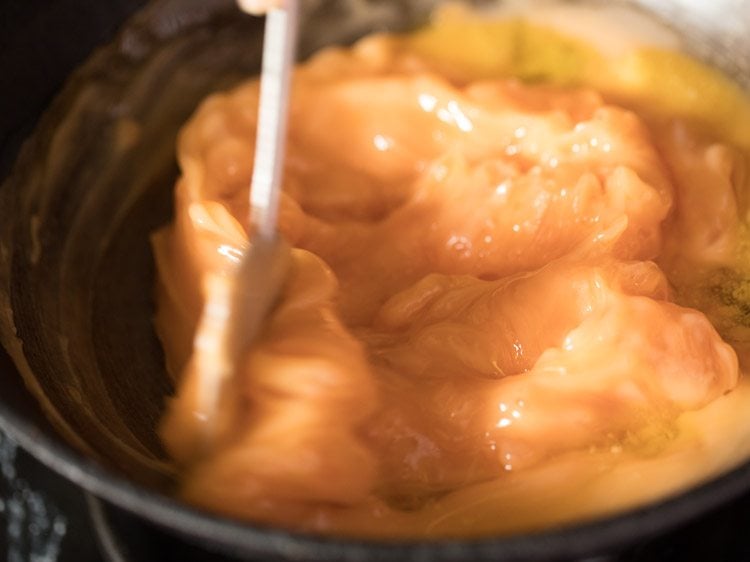
22. All of the ghee should be mixed well.
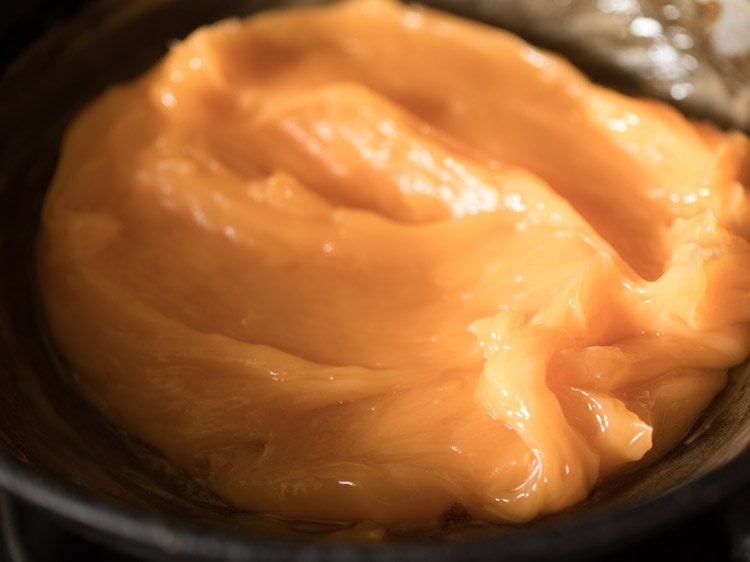
23. Then add the second portion of ghee.
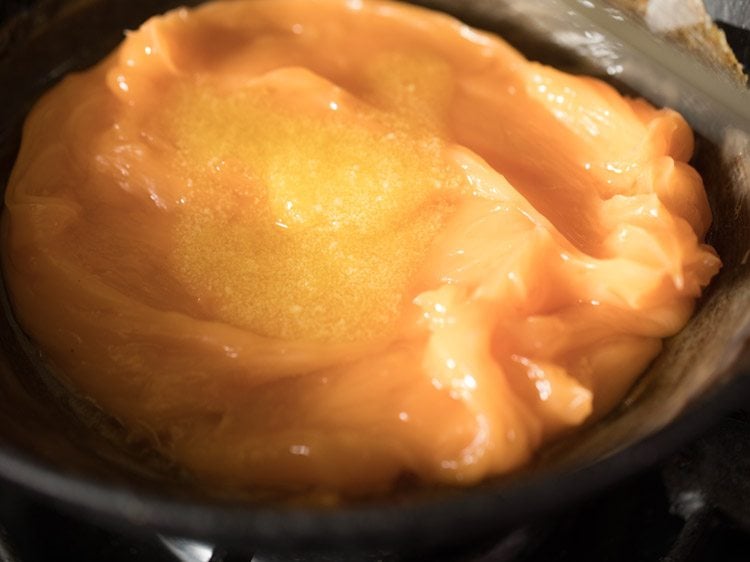
24. Mix again.
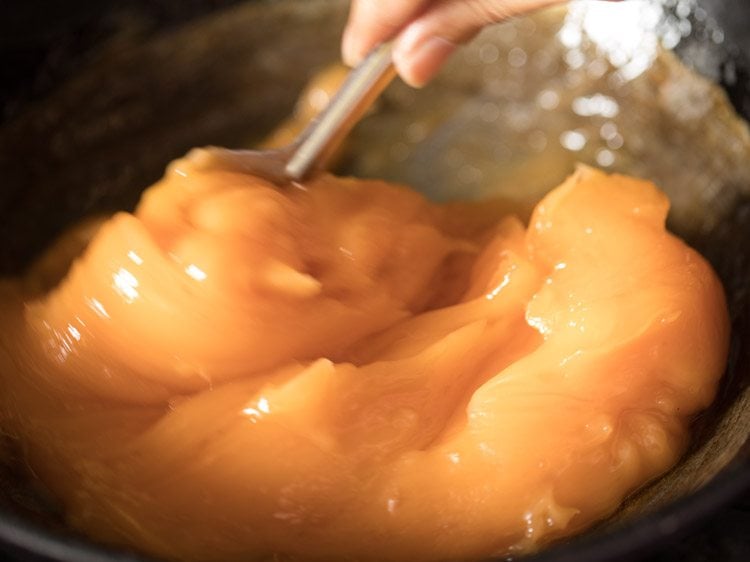
25. Continue to stir and mix when adding ghee in parts.
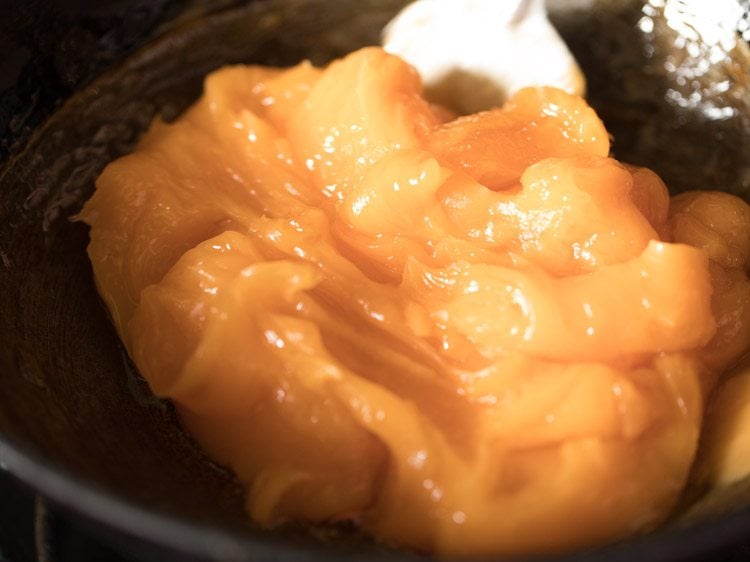
26. Add the last portion of ghee.
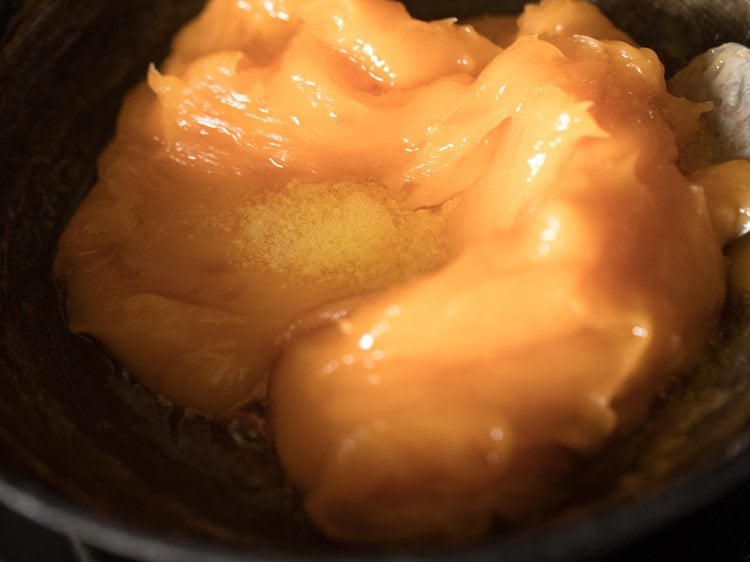
27. Stir and mix again and cook for 1 to 2 minutes stirring often, till the mixture gathers in one mass. By this time the mixture must have already left the sides of the kadai or pan. You will also see ghee releasing from the sides.
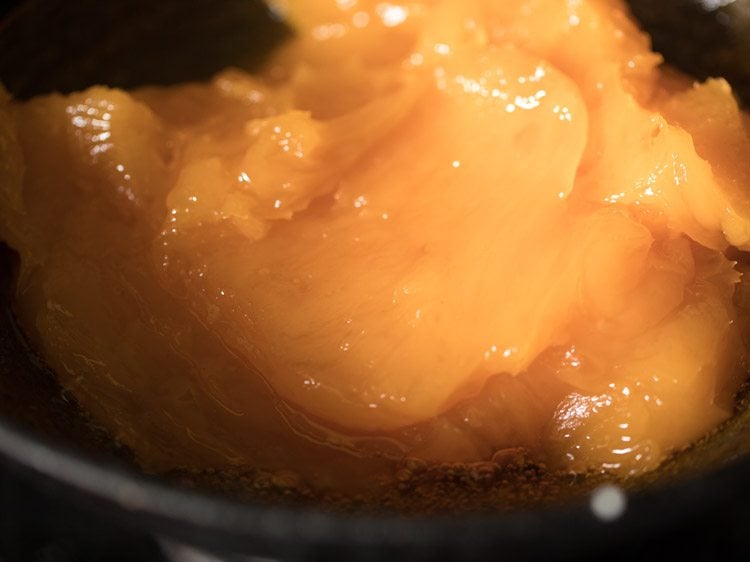
To check the doneness of karachi halwa
28. Take a small portion of halwa in a plate.
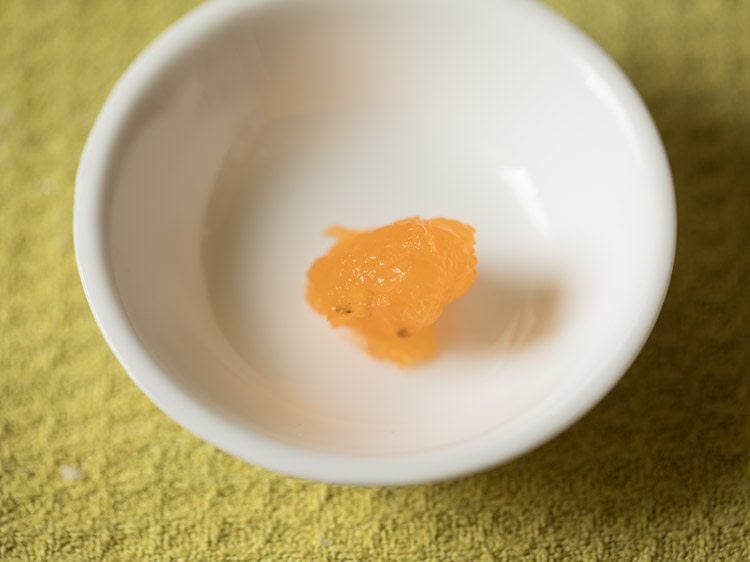
29. Then check if you can form into a ball. If yes then the karachi halwa is ready. While checking you have to be quick and not keep the halwa cooking in the kadai.
So either cool the halwa portion by placing it in water or use a napkin and with the help of the cotton napkin shape the halwa.
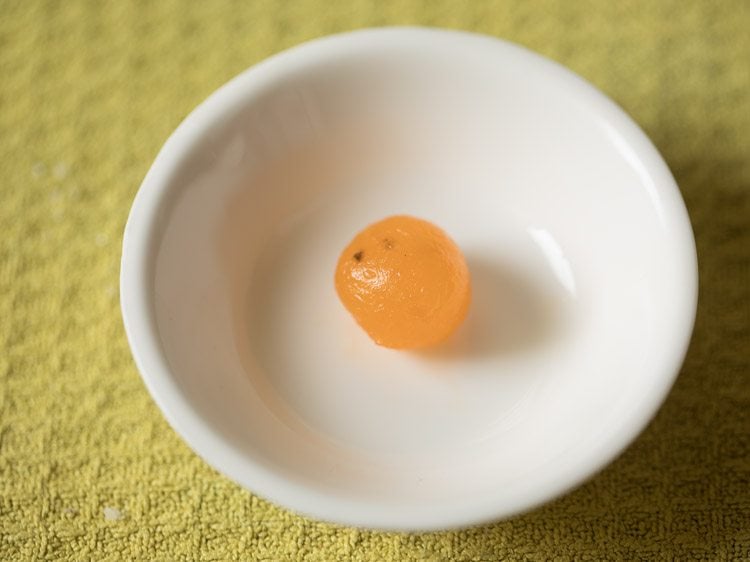
30. Once the mixture gather in one mass and has a translucent appearance, switch off the flame and quickly add 1 tablespoon sliced almonds, 1 tablespoon chopped cashews and ½ teaspoon cardamom powder.
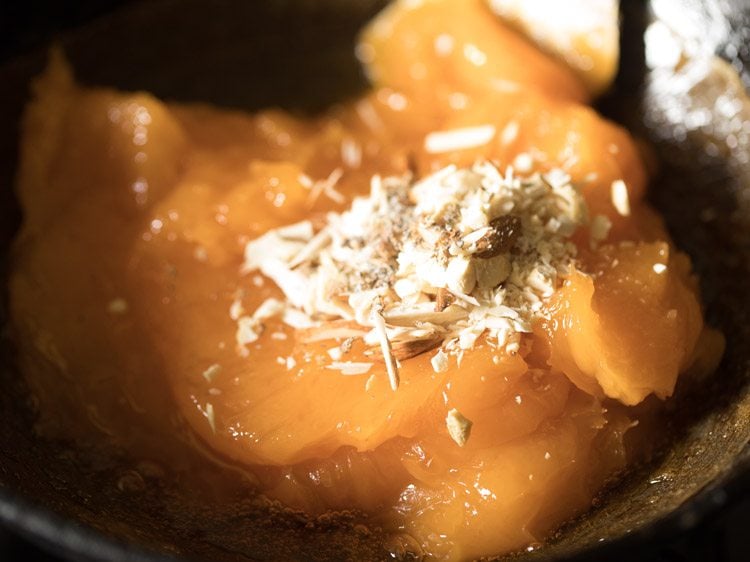
31. Then quickly add 1 teaspoon rose water. Rose water can be skipped if you don’t have it.
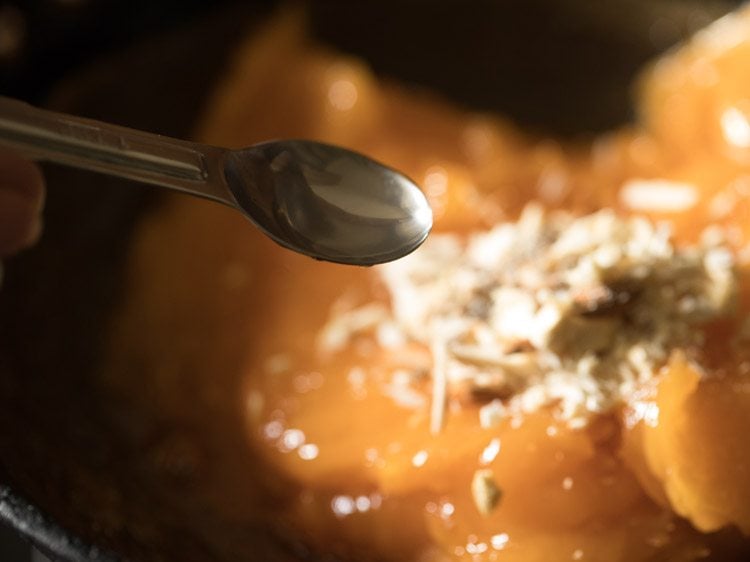
32. Mix immediately.
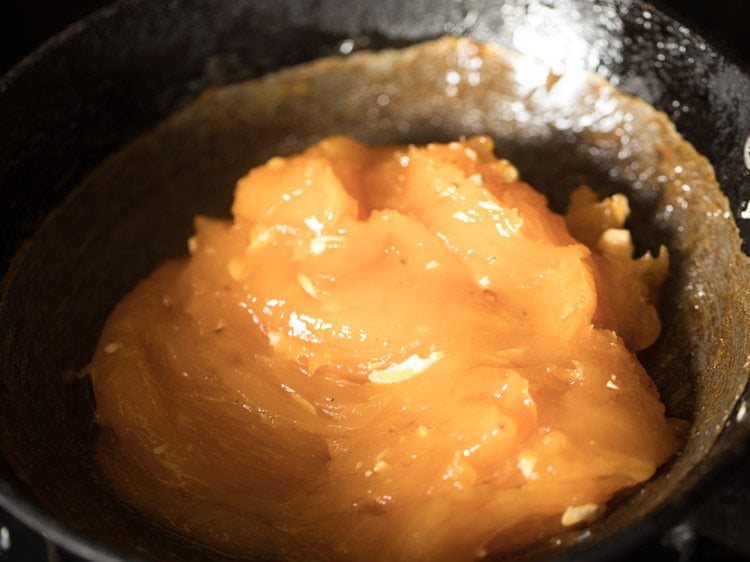
Setting karachi halwa
33. Quickly add the mixture in the lined or greased tray.
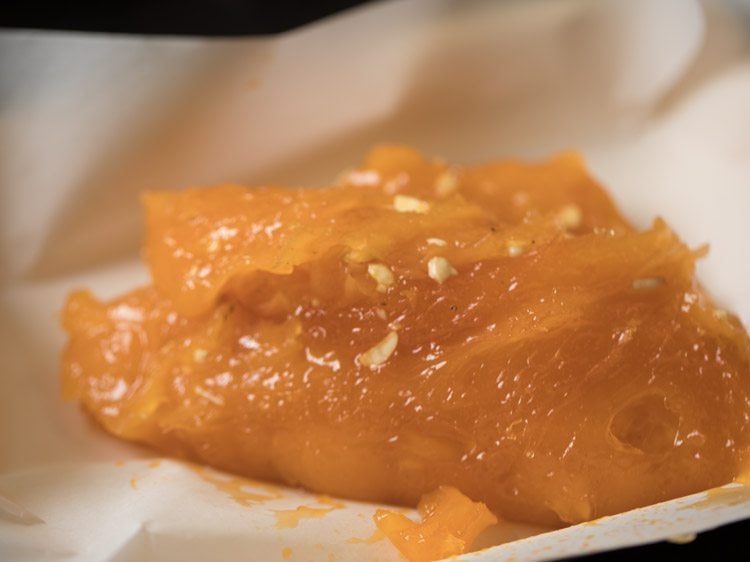
34. Begin to spread the karachi halwa mixture in the tray.
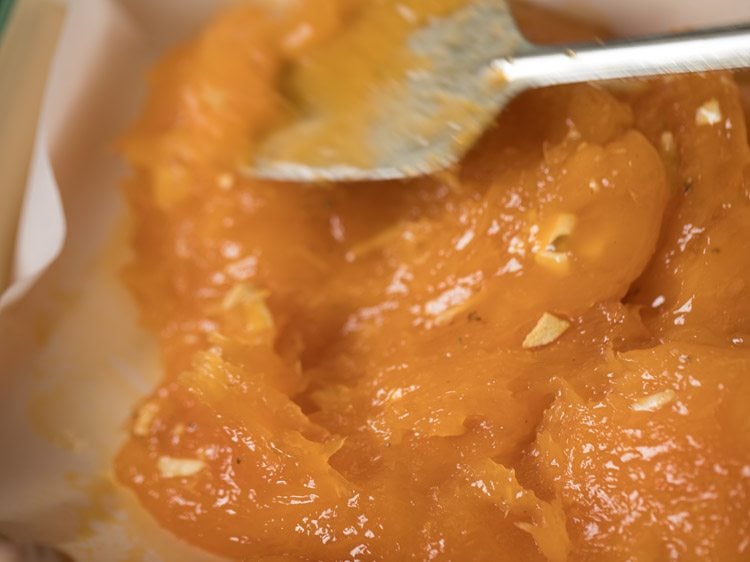
35. Then level with a spatula.
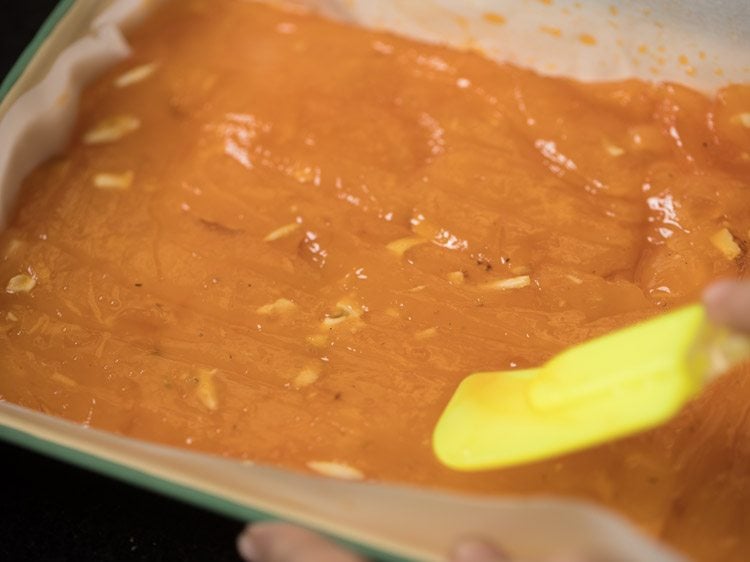
36. Level neatly.
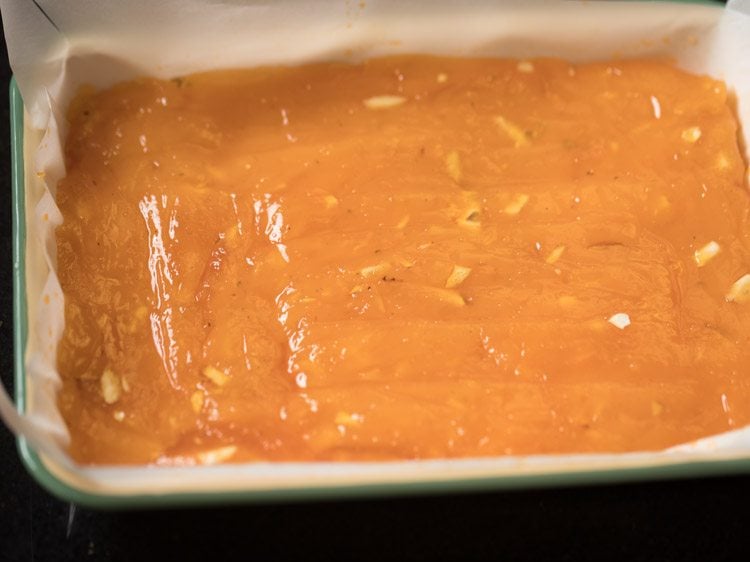
37. Then add 2 teaspoons sliced almonds and 2 teaspoons sliced cashews all over the karachi halwa.
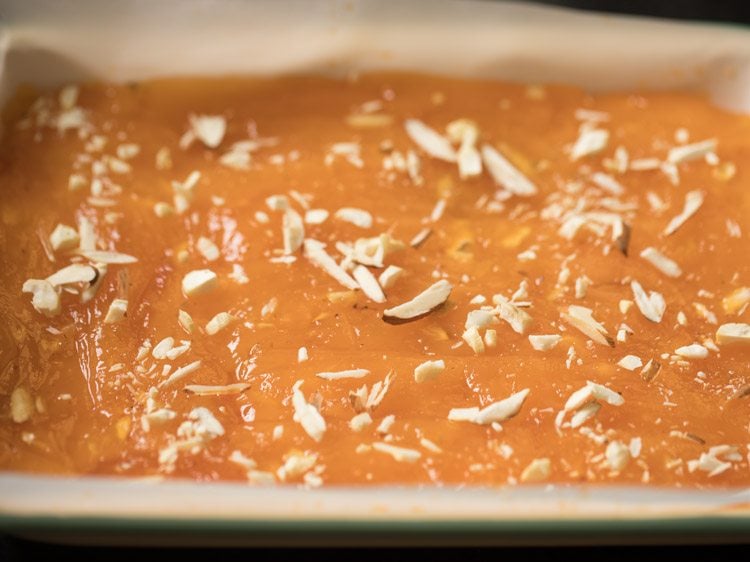
38. Press the nuts with spatula so that they stick to it.
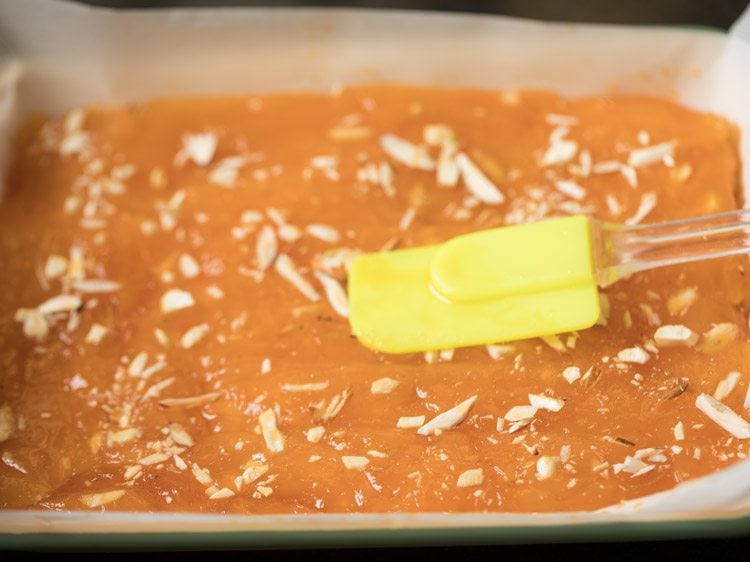
39. Allow the halwa to cool at room temperature.
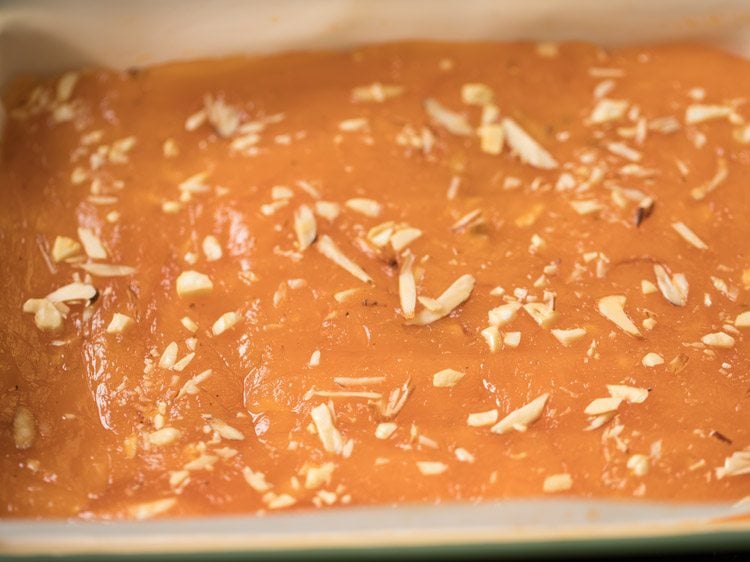
40. Once cooled, remove the karachi halwa.
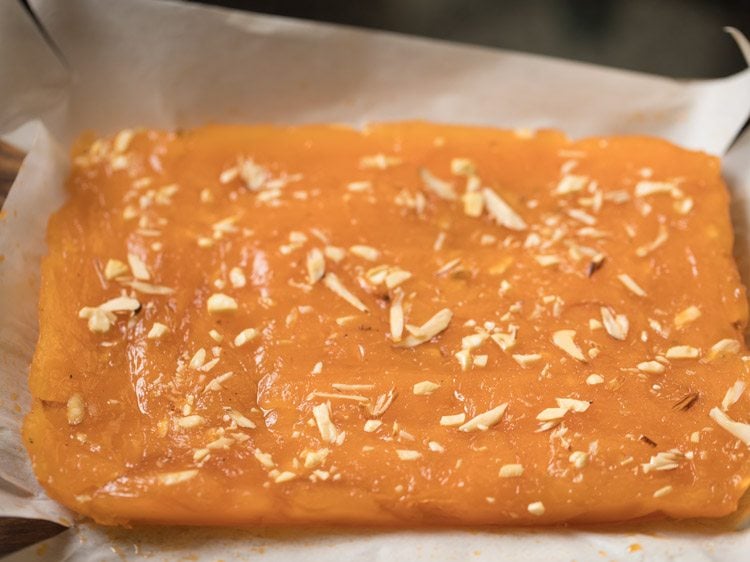
41. Then slice it in squares.
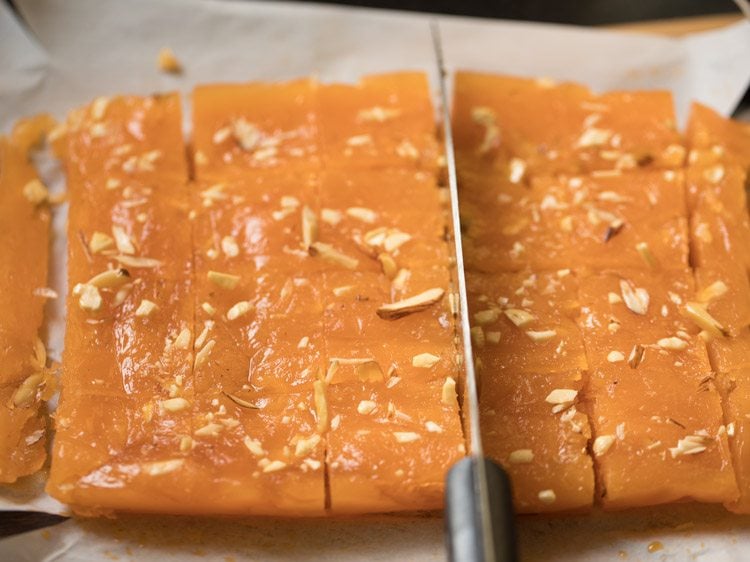
42. Serve karachi halwa as a festive sweet or an after meal sweet. Leftover can be stored in an air tight box and then refrigerated.
For more sweets recipes you can check this collection of Diwali sweets recipes.
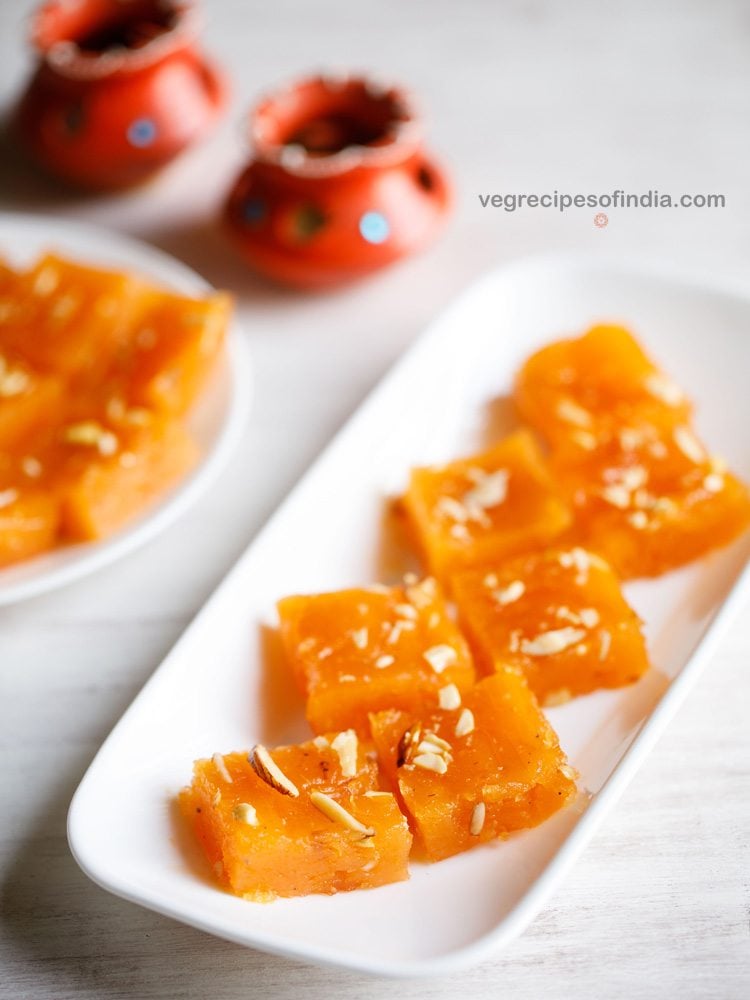
More halwa recipes
Please be sure to rate the recipe in the recipe card or leave a comment below if you have made it. For more vegetarian inspirations, Sign Up for my emails or follow me on Instagram, Youtube, Facebook, Pinterest or Twitter.
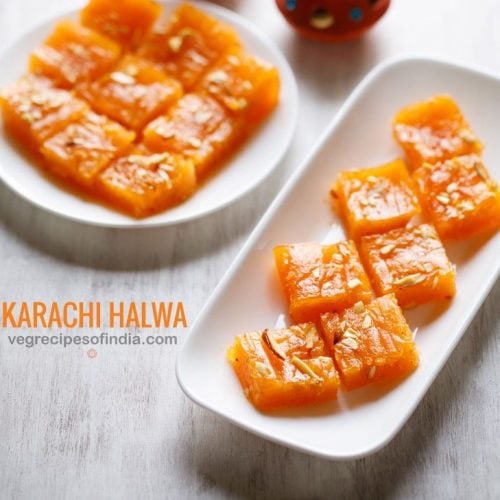
Karachi Halwa
Ingredients
for corn flour solution
- 1 cup corn flour or 100 grams corn flour
- 1 cup water for dissolving corn flour
for sugar solution
- 1 cup sugar or 200 grams sugar
- ½ cup water for dissolving sugar
- 1 teaspoon lemon juice
- 5 to 6 drops of natural orange color extract
other ingredients
- ¼ cup Ghee or 50 grams ghee (clarified butter)
- ½ teaspoon cardamom powder
- 1 teaspoon rose water
- 1 tablespoon sliced almonds
- 1 tablespoon chopped cashews
for garnishing
- 2 teaspoons sliced almonds
- 2 teaspoons sliced cashews
Instructions
preparation for karachi halwa
- First take 1 cup corn flour (100 grams) in a mixing bowl. add 1 cup water.
- Mix very well with a wired whisk. There should be no lumps. Keep aside.
- Line a tray or pan with butter paper or parchment paper. Alternatively you can grease the pan on the bottom and sides with some ghee. Keep aside.
preparing sugar solution
- In a heavy kadai take 1 cup sugar (200 grams). add ½ cup water.
- Add 5 to 6 drops of natural orange color extract. You can use any natural color extract like yellow, red, pink, green. You can also use about 1 pinch of saffron strands for a faint yellow color.
- Add 1 teaspoon lemon juice. mix well and keep the pan on a stove top.
- Keep the flame to medium-low and begin stirring the solution, so that the sugar solution dissolves. Then reduce the flame to a low or sim. Keep the flame to its lowest.
- Let the sugar solution come to a boil.
making karachi halwa
- Now take the corn starch solution and stir it again as the corn starch settles down at the bottom, so you have to mix everything again before you add in the sugar syrup.
- Add a part of the corn flour solution. Add corn flour solution in two to three parts.
- As soon as you add mix very well with a wired whisk.
- Then add the second part of the corn flour solution. mix and stir very well.
- Continue to mix and stir at non stop on a low flame. Now use a spatula or a spoon for stirring instead of wired whisk.
- The corn flour will begin to become sticky and thicken. Keep on stirring.
- Stir and mix till the entire mixture thickens.
- Once the entire mixture thickens, add ¼ cup ghee in two to three parts.
- As soon as you add ghee, mix well so that all of the ghee is incorporated in the corn flour mixture.
- All of the ghee should be mixed well.
- Then add the second portion of ghee. mix again.
- Continue to stir and mix when adding ghee in parts.
- Add the last portion of ghee.
- stir and mix again and cook for 1 to 2 minutes stirring often, till the mixture gathers in one mass. By this time the mixture must have already left the sides of the kadai or pan. You will also see ghee releasing from the sides.
to check the doneness of karachi halwa
- Take a small portion of halwa in a plate
- Then check if you can form into a ball. If yes then the karachi halwa is ready. While checking you have to be quick and not keep the halwa cooking in the kadai. So either cool the halwa portion by placing it in water or use a napkin and with the help of the cotton napkin shape the halwa.
- Once the mixture gather in one mass and has a translucent appearance, switch off the flame and quickly add 1 tablespoon sliced almonds, 1 tablespoon chopped cashews and ½ teaspoon cardamom powder.
- Then quickly add 1 teaspoon rose water. Rose water can be skipped. mix immediately.
setting karachi halwa
- Quickly add the halwa mixture in the lined or greased tray.
- Begin to spread the halwa mixture in the tray. then level with a spatula. level neatly.
- Then add 2 teaspoons sliced almonds and 2 teaspoons sliced cashews all over the halwa.
- Press the nuts with spatula so that they stick to it.
- Allow to cool at room temperature.
- Once cooled, remove the karachi halwa. then slice it in squares.
- Serve karachi halwa as a festive sweet or an after meal sweet. Leftover can be stored in an air tight box and then refrigerated.
Nutrition Info (Approximate Values)
This Karachi Halwa post from the archives, originally published in October 2017 has been updated and republished on January 2023.
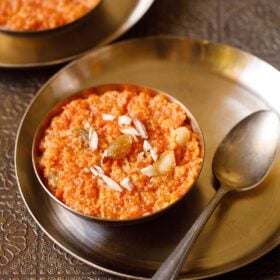
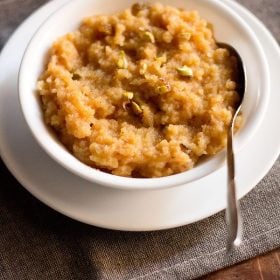
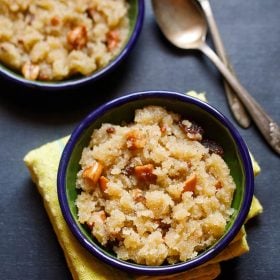
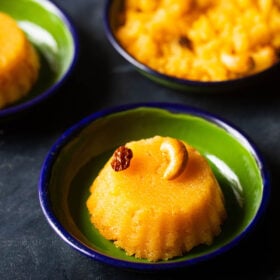








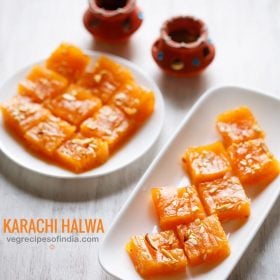
Hi
My halwa didn’t turned translucent and wasn’t sticky I used cornstarch.
If the proportion of sugar and water is not same as mentioned does that effect?
corn starch is the ingredient that is used in making karachi halwa. did you change the proportion of sugar and water as that does affect the consistency and texture?
Hi Dassana,
Do you have a list of dairy free Indian desserts (without milk, cream or ice cream. Ghee/butter are fine)? I am planning to make a seafood thali and wonder what sweet would go well with it.
hi priya, i have not categorized the desserts as dairy-free, but in the vegan category, you can get some desserts -https://www.vegrecipesofindia.com/recipe/vegan-recipes/
Hello Dassana!
I was reading random articles on Wikipedia when I stumbled upon the history of sugar refining, and thus I was directed towards India as there’s where it all started, and went on browsing its sweets.
Amongst the hundreds of pics, these little colourful jelly cubes stood out to me, and I read more and more about halwa and the many kinds.
I found out that the halwa I was attracted to was the Bombay/karachi halwa, and that it looked incredibly easy to make (especially since I have never cooked anything before. Maybe I once boiled an egg and that was it).
So I read a few recipes and watched some videos, until I settled on your recipe as it was well explained and easy to follow while cooking.
The hard part was sourcing the corn “flour”; it didn’t look anything like what you and everyone else is using, as I live in Italy and it is a different product. Thanks for clarifying it!
Turns out that it has a completely different name than both “starch” and “flour” where I live, but I managed to find equally-confused peers who had asked such question on the Internet, and finally managed to get ahold of the starch.
I also feared cardamom wouldn’t be available where I live, but it was on the very last shelf-pocket of the store I checked. Incredible scent, I had never seen nor eaten it; I was expecting something strong and spicy, knowing you indians love for fire-infused dishes!
What I needed was ghee, which I had never heard of; turns out it is very similar to clarified butter, so I watched some tutorials and read some recipes and I made it. Turned out beautifully with an intense aroma (mainly because I ALMOST burnt it… I had never worked with pans, fire, butter, so not being injured was already a great accomplishment).
After making the ghee, I was ready to prepare the cashews and almonds; I read that they tasted better if toasted in ghee, and so I did. This time I burnt myself with the sizzling and popping, but they indeed tasted much better.
I made a couple changes to your recipe: I toasted the nuts, and I used more (about 1.5x).
As for the cardamom, I used only the seeds, but kept the shells as they had lots of aroma. I then read that all the capsule is usable. Next time I’ll reduce it all into powder.
The rest was pretty straightforwards, I just followed your recipe and the blob in my pan behaved correctly. Adding the ghee and seeing it get absorbed and the mixture becoming less sticky was the best part!
Then it became kinda hard to mix the nuts and cardamom into the blob; it would just skid all over the pan, but I managed it.
As for the consistency test, I just grabbed a piece with the spoon I was using to mix and noticed if it would stay upright, as I burnt myself trying to make a ball and was too afraid of ruining the halwa by letting it sit in the pan.
The mold I chose was too big, so the shape of my halwa was horrible… I also skipped the food coloring, so it doesn’t look as good as yours. Just a whiteish goo with nuts.
But it does taste amazing!
The ghee and the cardamom can really be tasted and I like them a lot, it was a completely new flavour for me, and even the consistency is perfect!
My mom also liked it, but the real test was with an indian colleague of mine: she was very surprised by this sweet, especially since I had never cooked anything on my own, and she liked it! I guess I passed, thanks to your recipe 🙂
I might be making it again soon enough, as I now that I know I can do it and it tastes great.
I’ll also look for other recipes, what would you recommend that is as simple and good as this halwa?
Thanks for sharing!
D
thank you for a detailed comment. it is very rare that we get comments like yours and we appreciate you took the time and effort to explain in detail. it feels good to know that you were so much dedicated to make the halwa no matter what.
cardamom is a wonderful spice and you can add them to sweets or desserts. the husks are usable. you can easily make cardamom powder by using a coffee grinder or a dry grinder. add half to 1 tablespoon sugar for half a cup of cardamoms while grinding. the sugar help in grinding to a better texture. store in an airtight jar.
ghee is clarified butter. i should add this point in the recipe card. yes, nuts when fried in ghee or oil, taste better. i am glad that the recipe helped you. color does not matter, but the taste and texture is important in karachi halwa and you were able to manage it.
after making karachi halwa, you can make most of the indian sweets. karachi halwa can be tricky, but since you have passed the test with flying colors, other indian sweets would be a cakewalk for you.
there are many easy indian sweets you can try. you can check the recipes by typing in their names in the search bar or search icon. hope this helps and do let me know how the recipes turn out for you. happy cooking.
Thank you very much, Dassana!
I used a stone mortar for the cardamom, it turned into a very fine powder, but I have yet to try it with the shells.
All of the recipes you pointed out look simple enough to make, and the ingredients are easily found here. I’ll make sure to check out the whole diwali sweets list again; that’s where I landed on the karachi halwa recipe!
I remember I once tried some palm jaggery, offered to me by a random sikh I met at a scrapyard with a friend (sounds weird, right?) and it was very good. I love sugars! I’ll have to source it in some ethnic shop.
I’m especially interested in kheers, as they are also part of persian cuisine and a persian friend loves rice kheer.
I might try the besan ladoo first though, they look good and easily manageable to be taken to the office.
A kind of gram is also grown here and the taste is basically the same, according to my indian colleague, and boora appears easy to make!
I’m curious about the taste, it’s something we often eat in salty dishes, as I’ve never encountered any sweet based off of gram.
I’ll make sure to write a comment when I’ll get around to cooking something else off of your recipes!
Thanks, have a nice day!
welcome D. thanks for responding back. palm jaggery has a lovely earthy flavor. you can add them in place of sugar in most indian sweets. there is a rice pudding i make with palm jaggery and it is delish. it is called as nolen gurer payesh and i have already shared the recipe on blog.
yes, besan ladoo stay well for months at room temperature and can be easily packed in the lunch box. boora is powdered unrefined sugar. you can just buy unrefined cane sugar and powder it in a mixer or grinder. the taste is too good. we have besan both in salty and sweet dishes. even chickpea flour can be used.
sure, do let me know how the recipes go for you. it always helps to get genuine feedback and views from the readers.
thanks again and you too have a nice day.
Yummy and very easy recipe
Thank you
welcome sravs and thanks.
I want to try this tomorrow as I have my relatives coming in.. never tried before.. hope it comes out well.. ????????
I still miss your App Dasanna ????????
Seema, trust me this is a very delicious halwa. so don’t worry. its a tried and tested recipe. it was sad for us also to let go of the app.
Awesome. Thank you sharing nice recipe.
Welcome Foodzu
Can this recipe be halved? Just use half of everything? Will that work?
sarah, yes you can easily halve the recipe and it will work.